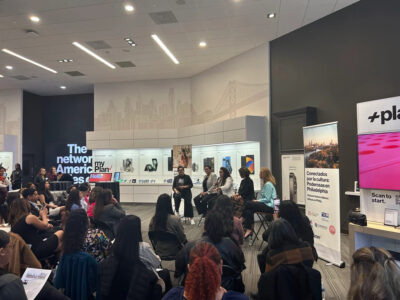Ten years ago today, on March 28, 2004, just as blogging was entering the mainstream, 16 years after I established my first Internet accounts (1988) and eight years after my first HTML website (1996), I started my blog PurpleCar.net.
I had just bailed out of a corporate IT career to start freelancing. My former coworkers encouraged me to start online “journaling” (cribbing the term from Live Journal, est. 1999) as a way to stay in touch.
To be sure, many things about the once-called blogosphere have changed, but mostly there are some good old bits of wisdom that stay the same. Here are 10 die hard lessons that I’ve learned from blogging over the last decade:
- Welcome to the (office) party: 2004 saw a surge in new personal blogs. Every John, Rambo and Marshal had their own site. Back then, companies courted us bloggers to advertise for them. Today the newest surge is coming from those very corporate entities. They seek to have professional and efficient content to reach their customers, so they are building their own content delivery systems.
- Come on, baby, move, move: Blogging software comes and goes. I started out on something called Blogware which eventually moved over to WordPress, all at the same host. Don’t be afraid to switch platforms if something new, better, and cheaper comes along.
- This is radio, not television: Multimedia wasn’t as widely available 10 years ago. Podcasting’s early days were based in HAM radio traditions and it took a few years for end-user software to hit the market. Still, the basis of the blog and dare I say the Web itself is still print. Use smaller images, embed audio and video from YouTube or the cloud. Fast download times are still an important key to a successful site.
- Give me the code: Custom design was superfluous back in 2004, but now it’s necessary. Readers can spot a ubiquitous template before your site’s top fold renders in their browser. Also, mobile compatibility is key now. Take a basic CSS class or barter with your designer friends for help. Good design engenders trust. (“Good design” also means pro logos and consistent branding, too).
- Business is Business: Finding and designing the virtual fountain pen that is your blogging platform is just the first step on the road to achieving your goals. I’d hate to say that you should have a business plan in place before you begin blogging, but it’s good practice. At least make a list of goals. If the goal is to simply have a space to spew, that’s fine. Make a list of topics you’ll spew about. Scratch out half of them. Stick to the half left over. The days of blogging about any old subject are gone.
- Be of good cheer: In the old days, a wonderfully curmudgeonly blogger was the delight of any bored Internet wanderer. Then the masses came out to the coast, got together, and had a few laughs. Then they wanted more laughs. So, brighten it up sometimes, Cowboy, even if you are blogging about serious subjects. Readers won’t come back if it is too much emotional work.
- We got you tape decks: Back up your work. I keep an archive of every single article on my machine at home which gets duplicated regularly. I’ve heard many a horror story of losing years of work to a host server crash or migration to different blogging software. Disk is cheap. Use it.
- Get with the program a little: Just like a business plan, an editorial calendar is a good idea. (This is also advice I don’t follow, but the corporate blogging people live and die by their editorial schedules).
- We do it the hard way: Successful blogging takes work. You must not only write regular posts but also build a social media presence on sites like Twitter, G+, Instagram, etc., to help support your work. Join clubs and make contacts. Investigate ways to get your writing seen in international settings. Blogging nowadays isn’t posting a simple essay and forgetting about it. The site hits are in the social media details.
- All things being equal, I’d rather be in Philadelphia: Think globally, blog locally. International ties are great, but there’s no place like home. My Philly and East Coast friends are my coworkers and my main readers. You have to get out and about, IRL, to succeed online. Putting a face to a name goes a long way in this virtual existence of ours.
Today’s blogging world is diverse. You may choose to forgo your own site for a Tumblr or a Facebook page.
If you are sharing only other people’s links and photos, using a microblogging platform may be the answer for you. But if you are a writer, a speaker, a dreamer, I strongly suggest building a place on the Web where you own and control your own work. Home is where the blog is.
Join the conversation!
Find news, events, jobs and people who share your interests on Technical.ly's open community Slack

Philly daily roundup: A better coffee supply chain; Philly Tech Week returns; Apply to Pennovation Accelerator

Philly daily roundup: Startups want office culture; New Venture Lab cohort; Penn Med's new AI leader

Will the life sciences dethrone software as the king of technology?
